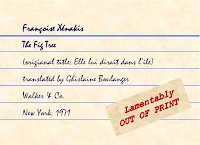The Thrush
(from Last Poems: 1918)When Winter’s ahead,
What can you read in November
That you read in April
When Winter’s dead?
I hear the thrush, and I see
Him alone at the end of the lane
Near the bare poplar's tip,
Singing continuously.
Is it more that you know
Than that, even as in April,
So in November,
Winter is gone that must go?
Or is all your lore
Not to call November November,
And April April,
And Winter Winter – no more?
But I know the months all,
And their sweet names, April,
May and June and October,
As you call and call
I must remember
What died into April
And consider what will be born
Of a fair November;
And April I love for what
It was born of, and November
For what it will die in,
What they are and what they are not,
While you love what is kind,
What you can sing in
And love and forget in
All that’s ahead and behind.
Edward Thomas (1878-1917)
British poet, essayist, and novelist




